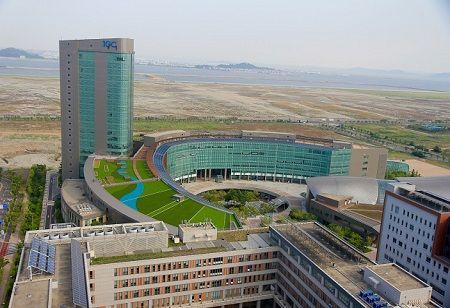The Incheon Global Campus Foundation entered into a Letter of Intent (LOI) with Yusharto Huntoyungo, Director General of Domestic Strategy at the Indonesian Ministry of Home Affairs, to forge a partnership aimed at enticing Southeast Asian students to enroll at the Incheon Global Campus (IGC).
Under this LOI, the parties have committed to collaborating on various initiatives, such as promoting international student enrollment at IGC, facilitating academic and cultural exchanges, and advancing mutual development in other areas of mutual interest. This partnership signifies a notable advancement in educational cooperation between South Korea and Indonesia.
Park Byung-Geun, CEO of the Incheon Global Campus Foundation, expressed his enthusiasm for the partnership, stating, "We will establish a mutual partnership with the Indonesian Ministry of Home Affairs to lay the groundwork for attracting Southeast Asian students in the future". His statement underscores the foundation's commitment to building a comprehensive cooperative relationship with the Indonesian Ministry of Home Affairs.
Yusharto Huntoyungo, representing the Indonesian side, praised the IGC model, noting, "The IGC model, as the only overseas university in Korea, is very impressive, and we will actively cooperate in attracting students from Indonesia and other Southeast Asian countries to IGC". His remarks highlight IGC's unique position in the landscape of international education in South Korea.
Currently, Incheon Global Campus hosts several prestigious institutions, including Stony Brook University (SBU) and the Fashion Institute of Technology (FIT) of SUNY Korea, George Mason University Korea, Ghent University Global Campus, the University of Utah Asia Campus, and the Stanford Center at Korea. The Stanford Center in Korea is particularly notable for its research related to smart cities. Unlike branch campuses, these resident universities operate as extended campuses, offering the same curriculum as their home campuses. All academic operations, including admissions, graduation, and degree conferral, are directly managed by the home campuses, ensuring that students receive an education equivalent to what they would get at the main campus.
The creation of IGC forms a crucial component of South Korea's strategy to globalize its higher education sector, attract international students, and enhance global competitiveness. This effort resonates with the rising preference among Southeast Asian students for studying abroad, with South Korea emerging as a favored destination due to its advanced educational offerings and the availability of English-taught programs.
The Indonesian Ministry of Home Affairs's involvement in this LOI underscores the government's dedication to promoting educational opportunities overseas for Indonesian students. This partnership aims to enhance not just student mobility but also foster academic and cultural exchanges, essential for nurturing mutual understanding and cooperation between both nations. As the collaboration advances, there is an expectation of a notable rise in Southeast Asian students at IGC, enriching the campus's multicultural academic milieu and bolstering its academic reputation. Moreover, this initiative mirrors the deeper economic and diplomatic relations between South Korea and Indonesia, reinforcing their interconnectedness across diverse sectors.

